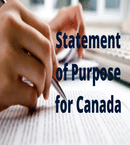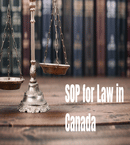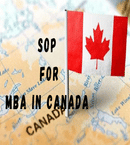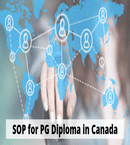Statement of purpose or Personal Statement is an essay centered on interest, desire, and self-knowledge of the students. It focuses on who the applicant is, his/her purpose of applying, reasons for considering himself/herself a qualified candidate, and their aspirations in the long run. SOP for MS in Canada is required by varied disciplines ranging from engineering to medicine and science.
Guidelines for SOP for MS in Canada
Students should know what a graduate school is looking for. The questions usually asked by the graduate schools in SOP for MS in Canada are as follows:
- Why does the applicant want to study in Canada?
- What does the applicant want to study at a particular university in Canada?
- What relevant experience does the applicant have in the science field?
- Why has the applicant chosen that particular university?
- What does the applicant plan to do with the MS degree once he/she graduates?
Some specific doormats recommended while writing SOP for Canada are given below:
- Times New Roman font with 12-point size
- 1-inch margins on all sides of the SOP
- 1.5-inch line spacing throughout the SOP
University-wise Requirements for SOP for MS in Canada
SOP for MS in Canada is regarded as the graduate application essay required to demonstrate why the applicant should be allowed to study this program at a particular university. Requirements for five top universities are listed below:
University of Toronto
The guidelines for MS SOPs at the University of Toronto are:
- Must be up to two pages in length
- A detailed explanation of career goals, work experience, skills and qualifications
- Concise and specific examples and sentences required, generic and vague statements are not accepted
- Information on academic research carried out (if any)
MS programs that require SOPs as mandatory requirements for admission are Aerospace Science and Engineering, Applied Computing, Laboratory Medicine and Pathobiology, Occupational Therapy and Sustainability Management.
McGill University
Applicants are advised to personally make a draft of SOP first before taking advantage of the resources made available by the McGill University to ensure it is at its best upon submission. This will enable them to produce a personal statement that reflects upon their character and personality, as opposed to following a textbook format.
These statements should focus on the applicant’s objectives, career experience, and intended area of specialization. For personal statement reviews, you can reach out to university at 514-398-3304. MS programs that require SOPs for admission are Biochemistry, Biotechnology, Computer Science, Mathematics and Statistics, Neuroscience, Physics and Psychiatry.
University of British Columbia
SOP for MS programs of the University of British Columbia is required in three parts:
- Part one (mandatory)
- Description of research interest (if any)
- One or two pages at most
- Future academic and career plans of the applicant
- Part two (if applicable)
- This part should begin with the most recent information and has no word or page limit
- Papers published or accepted in refereed journals
- Papers submitted to refereed journals
- Patents and copyrights awarded or submitted. This can include software but not publication copyrights
- Part three (if applicable)
- This part has no word or page limit
- It should begin with the most recent information
- Summary of scholarships, fellowships, honors, and awards should be given
- Awards and all items listed should be given a description in scope, value, name and period held
- Photocopies of scholarship certificates are strictly not required
Programs that require SOPs at the University of British Columbia are MS in Applied Animal Biology, Astronomy, Biochemistry and Molecular Biology, Chemical and Biological Engineering, Civil Engineering, Engineering Physics, etc.
University of Alberta
Biochemistry, Chemical and Materials Engineering, Mathematical and Statistical Sciences, Mechanical Engineering, Medical Microbiology and Immunology, and Psychiatry are some of the MS programs at University of Alberta that require submission of SOP.
- It should talk about the applicant's goals and interest
- Not be more or less than two pages
- Explains why the applicant wants to attend University of Alberta, academic timeline, and future aspirations
- Additional information peculiar to the applicant that relates to the admission criteria
University of Montreal (Université de Montréal)
MS programs that require SOPs at the University of Montreal are Biomedical Engineering, Communication, Mathematical and Computational Finance, Neuroscience, Physics, Social Work, etc. Following aspects should be covered:
- Should explain how the applicant’s career path is necessary for the applicant to enroll in a master’s degree
- Description of motives, goals, and experiences
- Applicant’s skills and experience that are relevant to the master’s program
- Should indicate the type of stream of MS program the applicant wishes to enroll in: a Research MS with dissertation or Professional MS with an internship
How to Write an Impressive SOP for MS in Canada
Applicants should only input details that matter. SOP should be relevant, concise and have a formal yet conversational tone.
- Talk about a problem you have faced in the past and how you overcame it.
- Explain the gap in the educational timeline (if any)
- Avoid repeating details already mentioned in the CV
- Should come off as stories rather than statements
- Avoid sending a generic document to several schools with only the names, dates, and few details changed.
- Avoid clichés and use active voices in sentences.
- Find an angle or ‘hook’, and carry out some research about the graduate program and the university.
- Ask professors (preferably the ones writing their recommendations) or families to proofread and provide feedback on the statement of purpose
SOP for MS in Canada is required to be simple, conversational with a professional tone. It plays a very vital role in deciding if the applicant will be accepted into the program. One of the most important facts to note is that SOPs for different levels of education (undergraduate, graduate, and research) vary in details and information required. Therefore, students should pay close attention not to give out the wrong impression and information.
![University of Toronto [U of T]](https://static.zollege.in/public/college_data/images/studyabroad/logos/college_104_25-12:44_University_of_Toronto-logo-2417C8AF32-seeklogo.jpeg?tr=w-50,h-50,c-force?tr=h-40,w-35,c-force)
![The University of British Columbia [Ubc]](https://static.zollege.in/public/college_data/images/studyabroad/logos/college_64_25-11:13_Capture.jpeg?tr=w-50,h-50,c-force?tr=h-40,w-35,c-force)
![McGill University [Mcgill]](https://static.zollege.in/public/college_data/images/studyabroad/logos/college_39_24-17:26_macgill.jpeg?tr=w-50,h-50,c-force?tr=h-40,w-35,c-force)
![University of Montreal [U de M]](https://static.zollege.in/public/college_data/images/studyabroad/logos/college_71_24-17:54_udem.jpeg?tr=w-50,h-50,c-force?tr=h-40,w-35,c-force)
![Simon Fraser University [Sfu]](https://static.zollege.in/public/college_data/images/studyabroad/logos/college_54_25-11:01_Capture.jpeg?tr=w-50,h-50,c-force?tr=h-40,w-35,c-force)
![University of Alberta [UAlberta]](https://static.zollege.in/public/college_data/images/studyabroad/logos/college_9_24-17:46_alberta-.jpeg?tr=w-50,h-50,c-force?tr=h-40,w-35,c-force)









1599027260.png?tr=w-305,h-145,c-force?tr=h-130,w-130,c-force)


